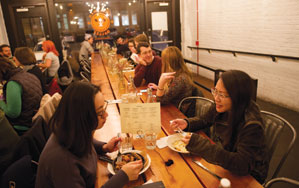Posted on August 22, 2017
By: Amanda Tran
Food halls offer small-scale opportunities for landlords, operators, chefs, and diners.
 AMID A CHALLENGING retail landscape dominated by news of brick-and-mortar store closings, the food hall has emerged as a promising opportunity for the commercial real estate industry and food entrepreneurs. Although food halls vary greatly in size and focus — ranging from “mega” halls, such as Mario Batali’s Eataly in Boston, Chicago and New York, to much smaller venues in aging strip malls, such as The Block in Annandale, Virginia, a suburb of Washington, D.C. — they all feature a mix of vendors offering high-quality artisanal food in a communal atmosphere.
AMID A CHALLENGING retail landscape dominated by news of brick-and-mortar store closings, the food hall has emerged as a promising opportunity for the commercial real estate industry and food entrepreneurs. Although food halls vary greatly in size and focus — ranging from “mega” halls, such as Mario Batali’s Eataly in Boston, Chicago and New York, to much smaller venues in aging strip malls, such as The Block in Annandale, Virginia, a suburb of Washington, D.C. — they all feature a mix of vendors offering high-quality artisanal food in a communal atmosphere.
Garrick Brown, vice president and head of retail research at Cushman & Wakefield, credits food halls’ explosive growth to the rise of “foodie culture” over the past 20 years and to the influence of millennial consumers. Brown explains, “For millennials, the emphasis is on authenticity. Processed foods are out; authentic and locally sourced foods are in.”





